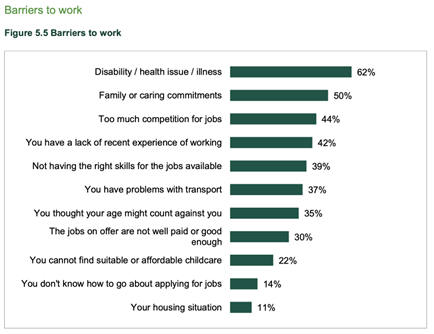
Looking to gain a greater understanding of the reasons for high levels of economic inactivity in Barnsley and the wider South Yorkshire region The Pathways to Work Commission commissioned IFF Research to interview economically inactive residents from the area.
The aim was clear: How can Barnsley enable all of their working populations, particularly those currently outside the labour market, to achieve pathways to employment?
Taking a quantitative approach with telephone interviews with 750 residents, we not only looked at the reasons for economic inactivity, but also the broader attitudes towards work and perceived barriers to moving back into employment. We also gained feedback on interventions that could help more people back into training and work.
Key findings from the research
Health is the most important factor.
76% of economically inactive residents we spoke to had a health condition, nearly all of whom (98%) said this affects their ability to carry out day-to-day activities. When asked to select the barriers that made it difficult to get employment, the most frequently selected barrier was health issues/disability/illness (62%).

Younger residents who had been out of work a shorter period of time are the most eager to get back to work.
- The desire to get back into work decreases the longer a resident is economically inactive. Nine in ten (91%) residents who had been out of work for less than a year were interested in taking a job that aligned with their skills and interests, compared to 60% of those who had been out of work for 5 years or more.
- Younger residents were much less likely to have a health condition or illness than older residents (87% of those aged 55-64 had a health condition, compared to 67% of those aged 25-34).
In general, attitudes towards work among residents of Barnsley and the rest of South Yorkshire were similar except in attitudes towards employment support.
Overall, there were no significant differences between the two groups. However, the Rest of South Yorkshire group were more in favour of getting back to work: 71% of the Rest of South Yorkshire say they would take a job that aligned with their skills and interests, compared to 64% of Barnsley residents.
Half of respondents said they could have been helped to stay in work and were interested in employment support.
- There was a 50/50 split in views when asked whether they felt they could have been helped to stay in work (51%), and whether they were interested in employment support from the council (48%).
- However, this also highlights the challenge for the commission that 50% of residents are not interested in employment support, therefore may not be open to interventions.
Affecting change
Speaking on the findings, Oliver Coppard, Mayor of South Yorkshire said:
“For too long, the health, skills and transport barriers that scar our region have prevented people here from making the most of their talents. The findings of the Pathways to Work Commission will help us to break down those barriers and unlock the talent and potential of our communities.”
The research has already reached a senior audience in government. The new Work and Pensions Secretary Liz Kendall MP delivered a landmark speech at the launch event on 23rd July about Labour’s plans to reform employment support to tackle economic inactivity, which was informed by the research.
This research informed one part of the commission’s large report on how to reduce economic inactivity and has been published in the Pathways to Work Commission Report – July 2024 (barnsley.gov.uk).
Lorna Adams, Research Director at IFF said:
“we’re really proud to have been involved in this important study addressing economic activity in Barnsley and South Yorkshire, and look forward to seeing how the findings can be used to support pathways to employment”.
For more info, you can download the full report.
Or, to discuss an upcoming insight need contact us at hello@iffresearch.com